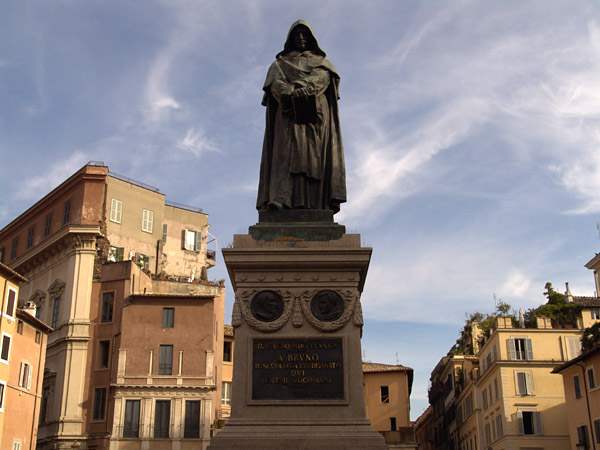
“A BRUNO – IL SECOLO DA LUI DIVINATO – QUI DOVE IL ROGO ARSE”
(“To Bruno – from the age he divined – here where the fire burned”).
If a term like Social Justice has to have any meaning, it needs to solve problems in society.
The biggest social problems typically have one thing in common: They create division.
Overcoming division and enhancing participation in a shared society is thus key to solving such problems.
The first component of Social Justice is thus a focus on society itself, on commonality, on unity, on harmony. Anything that enhances social peace is better than that which creates social strife.
Now to the second component, justice. Justice means a repairing of those aspects of society that are not contributing to social peace, to equal participation, to overcoming division. Problems past, present and future need to be addressed, honestly and openly, and remedies found for repairing the damage caused, and opportunities sought to increase social awareness of social injustice, in order to promote – jointly, collaboratively – social justice.
Social Justice is nothing but social peace, and peace means happiness, productivity, equity of access, equality of worth, shared humanity, acknowledgment of human dignity, even a recognition of the dignity of all life.
Social Justice draws from certain traumatic moments in human history, and aims to learn from them, create justice for the future out of the pain from the past. Social Justice sets itself as a reaction to the Holocaust and other genocides, slavery, mistreatment of others as a group due to culturally constructed differences such as race, class, gender, age, ability, species, and in the future surely the distinction between natural/artificial life forms. All these divisions exist because of culturally constructed differences that are creating differential understandings of others as human or infrahuman (to use Paul Gilroy’s term).
Thus if we truly want to work to enact social justice, some guidelines might help:
- We are all living beings with the same rights every human being has. We may be in different standing in society, in different professions, following different beliefs and ideologies, may be richer or poorer, but at the core, we are all the same. We all share in the human community and the human condition.
- We also share in community with our planet and the natural world; we are part of them, and our actions or inactions directly affect the natural world, and consequently again ourselves. We are all on the same planet, we share the same home, and everybody has a right to be here.
- We shall never forget that the categories of difference that discrimination is based upon are culturally and socially constructed. Reifying and validating these categories of difference will only further division instead of creating justice.
- We are all equal in worth and deserve to be treated with respect and dignity. Every single life matters, and a mistreatment of one is a mistreatment of all. Some of us are more vulnerable than others and may need to be given special consideration and support. Those who are strong have a duty to protect those who are weaker, and not exploit them.
- In a Social Justice framework, there can be no thinking of other human beings as enemies. We are all fellow living beings, no matter our differences.
- Without honesty, no community can survive. We need to be striving for truth always, wherever it may lead us, irrespective of ideology.
- If you favor Social Justice, you cannot hate other human beings. Hatred means dividing yourself from others, preventing a connection and understanding rather than building them.
- Free speech is absolute. Everybody should have a right to speak, just as everybody should also have a duty to listen and be respectful of each other. We only learn, we only progress, if we learn together and from each other, and if we progress together. Once people feel that their voices are being suppressed, they may vent their frustration in a space where much less learning will be possible, and further division is created.
- We need to recognize that we are all imperfect beings. We all have the right to say or do things and regret them later and be forgiven for them. Social Justice is social healing, first and for all.
- There shall not ever again be masters and slaves – no group shall set itself apart from the others. We need to overcome traditional hierarchy, not recreate it.
- There needs to be humility about the things we can achieve. We may have high aspirations, but a recognition of our fallibility protects against undue despair and depression. We do not live only to work, we work to live.
- There needs to be grace towards those that fail to live up to standards that may be seen as higher. We all travel through time throughout our lives, and the world keeps changing around us. Assume it will happen to you yourself eventually, and draw humility from that thought.
Certainly there could be more points, but for now, I’ll leave it here.

